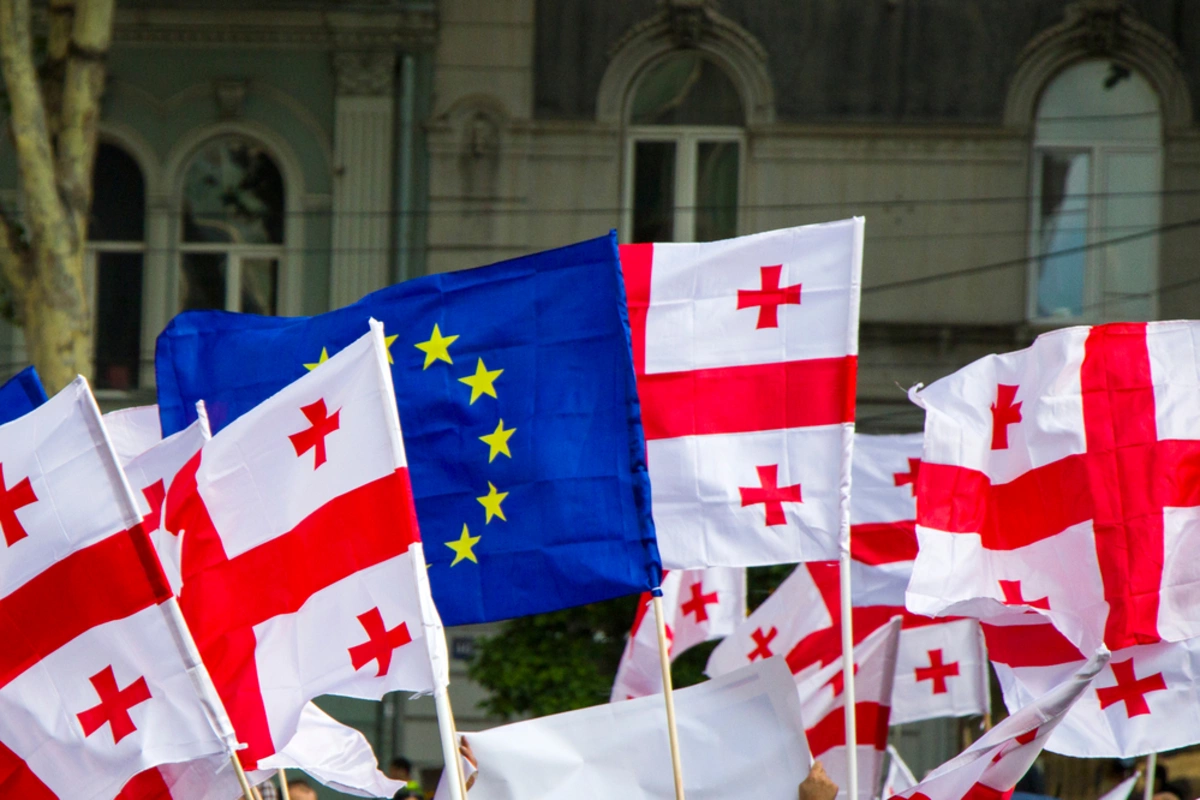
The closer the EU comes to a decision on granting candidacy status to Georgia, the more polarized politics becomes within the country.
Image: Tai Dundua/Shutterstock
Original article: Zaal Anjaparidze, The Jamestown Foundation. Many thanks to The Jamestown Foundation's Eurasia Daily Monitor for their collaborative spirit.
Georgia’s aspirations to become a candidate for EU membership were seen by many in the country as an effective consolidating factor for Georgian politics and society. It seems, however, that the process is having the opposite effect. The closer the European Union comes to a final decision on whether to grant candidate status to Georgia, the more polarized relations become between Georgia’s political actors and their supporters. In an article written for Euractiv on October 5, Sergi Kapanadze, founder and board chair of the Georgian think tank GRASS, called on the EU to be more “clear, robust, and specific” in its conditionalities for Georgia’s EU membership.
The European Union has given Tbilisi 12 conditions that it must meet for accession to the 27-member bloc. The first of these involves “addressing the issue of political polarization, ensuring cooperation across political parties.” Polarization has become a hallmark of Georgia’s political environment, leading to serious upheavals in social stability. This situation is compounded by Georgian politicians heavily exploiting the Russia question. Political opponents regularly seek to discredit one another by playing the “Russia card.”
Many Georgians expect that a second refusal from the European Union to grant Georgia candidate status will highly likely led to more pro-European groups taking to the streets in protest. A similar situation developed in 2022 when Brussels first denied Georgia candidate status. At that time, the European Union granted candidate status to Ukraine and Moldova while “recognizing” Georgia’s European perspective. Despite the protests demanding the resignation of the ruling party, the Georgian Dream (GD) party remains in power. As a result, some experts are doubtful regarding the opposition’s capability to topple the government through future protests. One of the reasons behind this assumption is the intention of opposition parties to portray themselves as “pro-Western.” These parties plan to continue to use possible EU candidate status as a key mechanism in the domestic political struggle against the increasingly pro-Russian GD government.
Numerous statements from European institutions, international media, and regional experts about the developments in Georgia underpin the opposition’s narrative about GD’s drift toward Russia (Europarl.europa.eu, June 8, 2022, February 13; Visegradinsight.eu, November 24, 2022; Epc.eu, September 15; Cepa.org, October 10). GD officials dismiss these accusations, asserting that Georgia has significantly outperformed other members of the “EU Association Trio” (including Moldova and Ukraine) in terms of carrying out the required reforms (Gfsis.org.ge, July 26, 2021). GD party leaders argue that most of the 12 conditions set by the European Union have been fully or largely fulfilled, except for depolarization.
The European Commission report from June 2023 on Georgia’s progress, however, states that only three out of 12 priorities have been fully implemented. The findings of the final report “EU Candidacy Check 6.0,” conducted by several Georgian civil society organizations, largely align with the EU assessments.
Brussels’ refusal to grant Georgia candidate status in 2022 seems to have had a slightly negative impact on Georgian public opinion. Although the latest polls on Georgian public attitudes toward the European Union demonstrate continued support for European integration, some alarming indicators have appeared. In the “Annual Survey 2023: Georgia,” the section on “Perceptions of the European Union” showed that 54 percent of Georgians still hold a positive view toward Brussels, which is 11-percent less than the results from the same survey last year. This indicator seems to have dropped mainly due to the growth of neutral attitudes among the Georgian public regarding EU actions. The European Union remains the most trusted international institution for Georgians (78 percent), though this trust has decreased by 5 percent compared to the previous year. While relatively minor, these shifts in public attitudes toward the EU coincide to some extent with earlier, more in-depth studies. One in particular from September 2021 revealed that, overall, only 46 percent of Georgians have either “very positive” (16 percent) or “positive” (30 percent) attitudes toward the European Union, with 43 percent having a “neutral outlook” and 7 percent with a “negative” attitude.
The EU decision on whether to grant or refuse Georgia’s candidate status will likely be a central issue in the upcoming 2024 parliamentary elections in the country. Accordingly, both the ruling party and the opposition parties will strive to use this matter in pursuing their own electoral interests. GD will naturally seek to take credit for Georgia’s candidate status, if granted, to win the election and stay in power. The opposition parties and their supporters are trying to convince Brussels to provide the status in such a way that GD officials would be unable to extract any political benefits from it. In Kapanadze’s article, he accused the GD government of “authoritarianism” and a “pro-Russian stance,” which undergirded his calls for Brussels to strictly hold the GD government to the conditions it has laid out. The degree to which EU officials will heed these signals remains to be seen.
The geopolitical stakes are high in this given the growing rivalry between Russia and the West in the South Caucasus. Prominent Russian commentators have called on the Kremlin to correct its mistakes in the region by pursuing more assertive policies (RIA Novosti, October 10). The Kremlin has taken such calls seriously in the past and revised its approach to the post-Soviet space accordingly.
On balance, in this author’s opinion, the benefits of the European Union granting Georgia candidate status outweigh the risks. Brussels will need to determine the proper course in this, so as not to exacerbate the country’s deeply polarized political scene. Official EU candidate status will give Georgia a strong and unequivocal directive to continue along the road to justice, peace, and security.
Share on social media